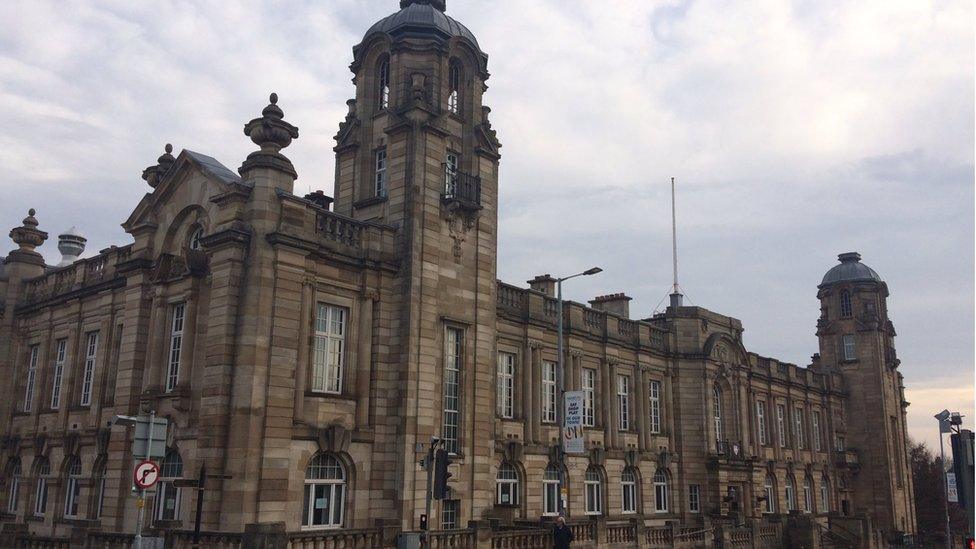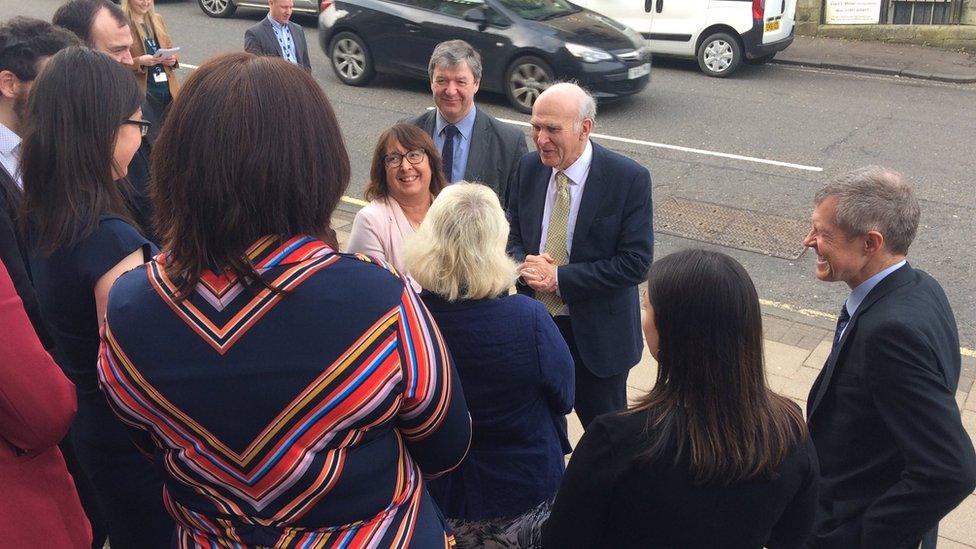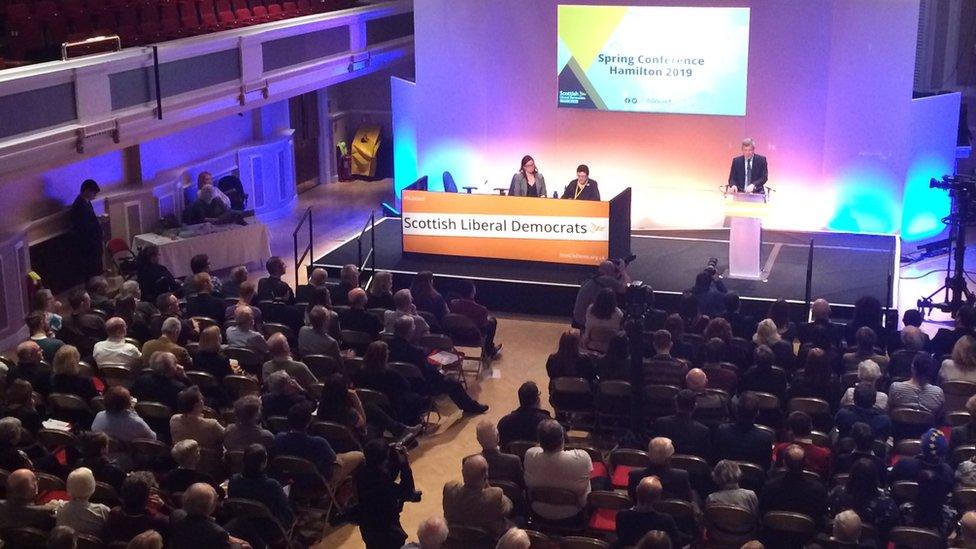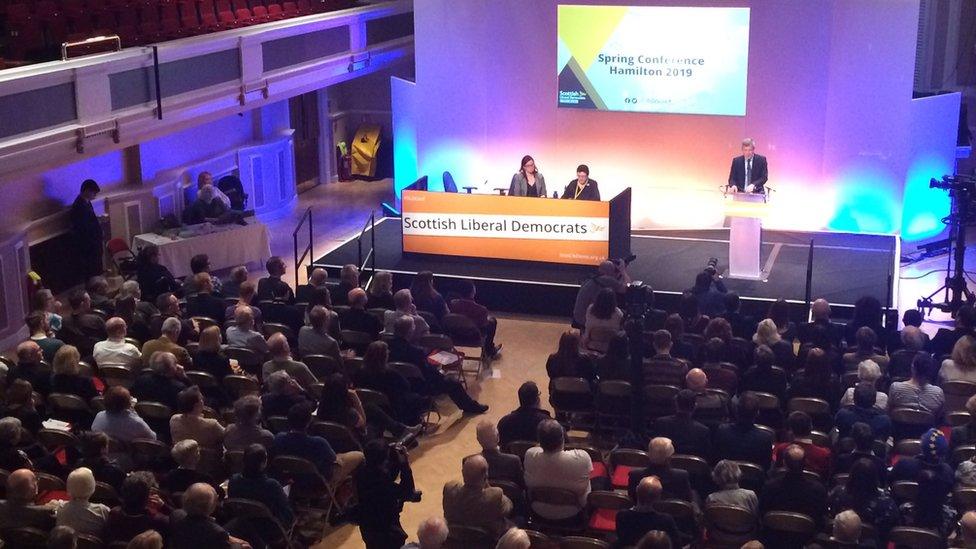Lib Dems in Hamilton: diminished clout
- Published

The setting for the Lib Dem conference in Hamilton is a grand one
The ancient, proud Royal Burgh of Hamilton has long considered itself a little bit of a cut above. Perhaps it is its history. Perhaps it is the enormous palace which once dominated the area before subsidence brought it low.
The town is not now, perhaps, what it once was. But there are lingering signs of grandeur. For example, the Town House, where the Liberal Democrats are conferring, is monumentally impressive, both outside and in.
Comparably, the Scottish Liberal Democrats have a persistent aura surrounding them, a sense of vanished or, at least, diminished clout.
This, after all, is the party of Gladstone, Lloyd George, Campbell Bannerman and Asquith. It is the party which provided transient shelter for Winston Churchill as MP in the great and noble city of Dundee, for fourteen years.
(After defeat in Dundee, Churchill returned to the Tories. As he said: "Any fool can rat on a political party. It takes a genius to rerat.")
Much more recently, the Lib Dems formed coalition governments in both Holyrood and Westminster. Call Tavish Scott to speak and you are calling a former minister. Call Jo Swinson, ditto.
Those memories, long and short, linger in the hall like spirits at a séance. They know they were previously partners in power. They yearn to return.
But they know too that their Westminster coalition with the Conservatives provoked a degree of disquiet, to say the least, among potential supporters.
Those two competing factors help influence their attitude to the remarkable developments in British politics this week.

Vince Cable senses an opportunity - but he is a naturally cautious man
Willie Rennie, the Scottish Lib Dem leader, tells me he is hugely excited by the defections from Labour and the Tories, forming a new independent group.
Sir Vince Cable, laconic and self-contained as ever, makes much the same point when I interview him in Hamilton today.
But both use the phrase "early days". You can tell that both, in their distinctive ways, sense an opportunity for their party. But history, especially recent history, teaches them to be cautious.
That, and a sense that politics generally is in turmoil as a consequence of Brexit. I asked Jo Swinson to forecast what might happen in the Commons just next week.
The normally loquacious Ms Swinson was momentarily - only momentarily - set back. She stressed the malleable nature of contemporary politics and argued for a second referendum.
On that issue, Lib Dems sense their idea may be advancing towards fulfilment. They already have the support of the SNP. The new independent Grouping back such a development. There are intriguing hints from Labour - although nothing firm.
But nothing is certain. Lib Dems, like everyone else, have learned to eschew firm forecasts in such a variable season.
Willie Rennie's keynote speech today contained a demand for what his party and others call a People's Vote.
He also argued that the Scottish government had gone too far down the road of increasing taxes in certain fields, warning that it risked damaging the economy.
And, deploying a curious phrase, he suggested that Nicola Sturgeon might usefully spend her "last days in government" fixing problems with public services rather than seeking to "break up the country" that is the United Kingdom.

Willie Rennie used his conference speech to reach out to Labour and Conservative rebels
I picked up those points with senior delegates in interviews here - and especially that point about a further referendum on independence.
Was it consistent, I queried, to demand a further referendum on Europe - but to reject one on independence?
Had not circumstances in relation to independence also changed in that voters were advised by supporters of the Union in 2014 that the way to keep Scotland in the EU was to keep Scotland in the UK?
The replies? Sir Vince argued that the independence ballot was different. The EU vote had altered the status quo. The independence vote had not. It was right to check whether the EU vote still stood, whether it was confirmed.
Further, Jo Swinson referred to the existence of a substantive White Paper in 2014. And Alex Cole-Hamilton MSP said, more fundamentally, that his party did not support independence and therefore would not advocate a referendum.
These remain matters of contention.
For now, though, this is an enthused, if still slightly diminished party, in an imposing environment. They sense, they dare to hope, that the political atmosphere may be about to become more congenial for them once again.
- Published23 February 2019
